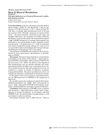
Search
for
Sort by
Research
300-330 / 558 results
research Tackling Chemotherapy-Induced Alopecia
Chemotherapy-induced hair loss is a major concern, but various treatments show promise in preventing and reversing it.

research Estrogen Deficiency as a Cause of Decreased 1-Alpha-Hydroxylase Activity
Estrogen deficiency can reduce the enzyme activity needed to activate vitamin D.
research Clinical Nutrition Program Improves Sensory Loss in a 60-Year-Old Truck Driver with Anti-MAG Neuropathy
A clinical nutrition program improved sensory and motor function in a 60-year-old with anti-MAG neuropathy.

research Mechanisms Involved in the Relationship Between Vitamin D and Insulin Resistance: Impact on Clinical Practice
Vitamin D might help regulate insulin in the body, but taking Vitamin D supplements doesn't clearly prevent or improve type 2 diabetes. More research is needed.

research The Possible Association of Female Pattern Hair Loss and Alteration in Serum Cholecalciferol Level
Low vitamin D levels can significantly contribute to hair loss, especially in women aged 35-45. Correcting these levels early may help prevent and treat this condition.

research Gingival Hyperplasia Secondary to Everolimus Therapy
A woman developed thick gums from everolimus treatment after a kidney transplant.

research Aging Skin: A Window to the Body
Skin aging reflects overall body aging and can indicate internal health conditions.
research Nonscarring Alopecia Associated with Vitamin D Deficiency
Low vitamin D levels might cause hair loss that can be treated with vitamin D supplements.

research Imaging Nanoscale Changes in Desmosome Protein Organization
Desmoglein 3 organization in cell connections changes without calcium, affecting cell adhesion.

research Individual Variation in Balance Between Platelet-Secreted Growth Factors Causing Contradictory Effects on Hair Follicle Could Potentially Impact Response to PRP Therapy in Patients With Scalp Hair Loss
People respond differently to hair loss treatment with PRP because of individual differences in growth factors from platelets.

research A Novel Animal Model of Desmoglein 1 (Dsg1) Deficiency Reveals an Essential Role for Dsg1 in Epidermal Barrier Formation
Dsg1 is essential for maintaining a healthy skin barrier in mice.

research IL-9 Mediated Human Primary Keratinocytes Invasion Is Dependent on MLC Controlled Contractility and Independent of MMP Activity
IL-9 increases skin cell movement but decreases their ability to invade, and this effect is controlled by cell contractility, not by MMPs.

research Integration of Magnetic Tweezers and Traction Force Microscopy for Exploring the Mechanobiology of Keratinocyte Cell-Cell and Cell-Matrix Anchoring Junctions
The conclusion is that a new method combining magnetic tweezers and traction force microscopy may help understand skin cell interactions and diseases.

research 25 Hydroxyvitamin D 1 Alpha-Hydroxylase Is Required for Optimal Epidermal Differentiation and Permeability Barrier Homeostasis
The enzyme 25 Hydroxyvitamin D 1 α-Hydroxylase is essential for healthy skin and recovery after skin damage.

research Resolution of Elevated Alkaline Phosphatase After Joint Replacement in Severe Osteoarthritis
Joint replacement surgery normalized high alkaline phosphatase levels in a patient with severe osteoarthritis.

research Novel Synergistic Approach for Bioactive Macromolecules: Evaluating the Efficacy of Goat Placenta Extract in PEGylated Liposomes and Microspicules for Chemotherapy-Induced Hair Loss
Goat placenta extract in a special delivery system improved hair growth and thickness in chemotherapy patients.

research A Study on the Extracts of Cuscuta Reflexa Roxb. in the Treatment of Cyclophosphamide-Induced Alopecia
Cuscuta reflexa extracts helped regrow hair in rats with drug-induced hair loss.
research Dissecting the Impact of Chemotherapy on the Human Hair Follicle
Chemotherapy damages hair follicles, causing hair loss and other cellular changes.

research Ultraviolet B Preconditioning Enhances the Hair Growth-Promoting Effects of Adipose-Derived Stem Cells Via Generation of Reactive Oxygen Species
Low-dose UVB light improves hair growth effects of certain stem cells by increasing reactive oxygen species.

research Functional Analysis of VDR Gene Mutation R343H in a Child with Vitamin D-Resistant Rickets with Alopecia
The R343H mutation in the VDR gene causes vitamin D-resistant rickets with alopecia by impairing specific gene activity.

research Vitamin D-Dependent Rickets Type II
A 3-year-old with vitamin D-resistant rickets and severe hair loss died despite treatment, highlighting the need for improved management of the condition.

research Medical Dermatologic Conditions in Transgender Women
Hormone therapy in transgender women can affect hair growth and acne, and there are specific skin issues related to gender-affirming surgery, but more research is needed on their dermatological health.

research Dermatologic Side Effects of Psychotropic Medications
Psychotropic medications can cause skin reactions, including severe conditions like SJS and TEN, and it's important for psychiatrists to recognize and manage these side effects.

research The Endocrine Function Of The Skin: An Analytical Narrative
The skin acts like an endocrine organ, producing hormones that affect various body functions and skin health, and understanding this can lead to new treatments.

research Finasteride: A Steroid-Unsparing Drug?
Adequate steroid treatment needed to limit bone loss in PMR patients.

research Diuretics
Diuretics help the body get rid of excess salt and water by acting on the kidneys in different ways.

research The Effect of Alfacalcidiol and Metformin on Metabolic Disturbances in Women with Polycystic Ovary Syndrome
Metformin effectively improves metabolic symptoms in women with PCOS, while alfacalcidiol does not have a significant impact.

research Electrospun 3D Nanofibrous Materials and Their Applications in Orthopaedics
Electrospun 3D nanofibrous materials show promise for bone regeneration in orthopaedics.
research Hereditary Vitamin D Resistant Rickets: Clinical, Laboratory, and Genetic Characteristics of Two Iranian Siblings
Two siblings with a genetic mutation had a form of rickets that doesn't respond to vitamin D.